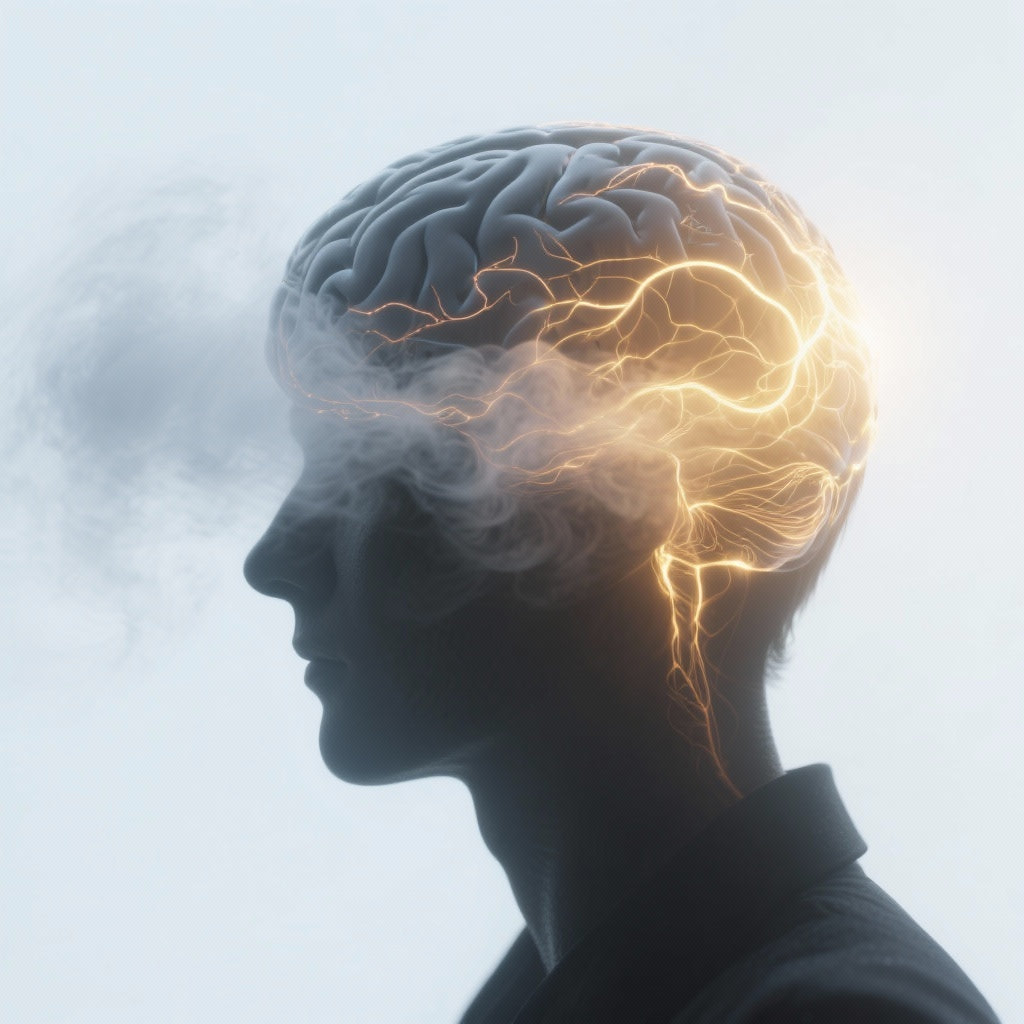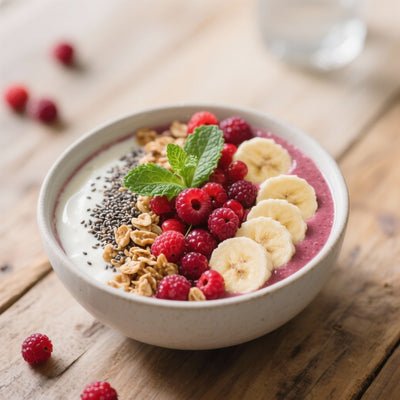Brain fog: What is it and how to clear it naturally
Do you sometimes feel like your brain is running on low power, enveloped in a cottony haze? This lack of clarity, this difficulty concentrating or remembering simple information, isn't inevitable. It's a sign of the infamous "brain fog." This article is your complete guide to understanding this frustrating phenomenon and, above all, to discovering natural and practical strategies to dispel it. We'll explore its root causes, from diet to stress, and provide you with actionable solutions to regain your mental sharpness, energy, and full cognitive capacity.
What exactly is brain fog?
The term "brain fog" is not an official medical diagnosis, but rather an expression that accurately describes a set of subjective symptoms related to a decline in cognitive function. It's the feeling that your thinking is slow, blurry, and laborious. Far from being a simple passing fatigue, it's a condition that can have a lasting impact on your productivity, self-confidence, and quality of life.
More Than Just a Distraction
It is crucial to distinguish brain fog from a moment of inattention. While a distraction is fleeting, brain fog is a more persistent state, a kind of mental background noise that makes even the simplest intellectual tasks particularly difficult. It can feel like having to wade through a thick fog to achieve a clear thought or make a decision.
Common Symptoms to Watch For
If you recognize yourself in several of the following points, you may be suffering from brain fog:
- Difficulty concentrating: Inability to focus on a task, mind that constantly wanders.
- Short-term memory problems: Forgetting why you entered a room, where you put your keys, or what you were going to say.
- Slow thinking: A prolonged mental reaction time, a difficulty in processing information quickly.
- Mental fatigue: A feeling of intellectual exhaustion even after moderate mental effort.
- Lack of mental clarity: Feeling "in a fog", confused or disoriented.
- Difficulty finding the right words: The word is on the tip of the tongue, but it's impossible to grasp it.
The Roots of Evil: Where Does Brain Fog Come From?
Brain fog is rarely caused by a single factor. It's most often a symptom of a deeper imbalance in your body and lifestyle. Understanding its origins is the first step to effectively clearing it.
Chronic Stress: The Number One Enemy of Mental Clarity
In our modern society, stress is everywhere. When it becomes chronic, it triggers a continuous release of cortisol, the stress hormone. Long-term elevated cortisol levels can have devastating effects on the brain, particularly on the hippocampus, a region crucial for memory and learning. It also promotes inflammation, a key factor in brain fog. Do you feel like stress is making you "dumb"? It's not just a feeling; it's a neurochemical reaction.
Lack of Sleep: When the Brain Doesn't "Cleanse" Itself
Sleep is not a passive state. It is during deep sleep that your brain activates its internal cleaning system, the glymphatic system. This process eliminates metabolic waste and toxins accumulated during the day. Insufficient or poor-quality sleep prevents this cleaning, leading to an accumulation of "debris" that impairs neuronal communication and causes that foggy feeling upon waking and throughout the day.
"Thinking of sleep as simply rest is a fundamental mistake. It is a phase of active brain maintenance and detoxification, absolutely essential to daytime cognitive function."
– Dr. Maiken Nedergaard, co-director of the Center for Translational Neuromedicine
Food: The Fuel (or Poison) of Your Brain
What you eat has a direct and rapid impact on your mental clarity. A diet high in refined sugars, simple carbohydrates, and ultra-processed foods causes blood sugar spikes followed by sharp drops, disrupting the energy supply to your brain. Furthermore, these foods are often pro-inflammatory. Chronic inflammation, even at a low level, is a major cause of brain fog. Undiagnosed food sensitivities (gluten, dairy) can also be culprits.
Nutritional Deficiencies and Dehydration
Your brain is a nutrient-hungry organ. Deficiencies in B vitamins (especially B12), magnesium, iron, or omega-3 fatty acids can directly impact your cognitive abilities. Similarly, even mild dehydration can reduce concentration and short-term memory. Sometimes, a simple glass of water can make a noticeable difference.
Hormonal Imbalance and Other Factors
Hormonal fluctuations can wreak havoc on your brain. Perimenopause, thyroid problems (hypothyroidism), or an imbalance in the gut microbiota (the gut-brain axis is fundamental) are common causes of brain fog. Finally, a sedentary lifestyle, lack of exposure to natural light, and certain medications can also contribute to this condition.
Natural Strategies to Dispel Brain Fog
Fortunately, you have the power to take action. By changing certain lifestyle habits, you can actively combat brain fog and restore your mental clarity. Here's a holistic and natural approach.
1. Make Sleep a Non-Negotiable Priority
Consider sleep your most powerful tool. Aim for 7 to 9 hours of quality sleep per night. To achieve this, establish a strict sleep routine:
- Regular schedule: Go to bed and wake up at the same time every day, even on weekends, to regulate your biological clock.
- Sleep sanctuary: Your bedroom should be cool, dark, and quiet. Invest in blackout curtains and earplugs if necessary.
- Digital detox: Ban all screens (phone, tablet, computer) at least one hour before bedtime. Blue light suppresses melatonin production.
- Relaxation ritual: Establish a soothing routine: reading, hot bath, chamomile tea, meditation or deep breathing exercises.
2. Adopt an "Anti-Fog" Diet
Feed your brain with the right nutrients to fight inflammation and stabilize your energy. Focus on whole, unprocessed foods.
Did you know? The Mediterranean diet, rich in vegetables, fruits, oily fish and olive oil, is associated with a 35% reduction in the risk of cognitive decline according to a study published in Neurology .
Foods to favor:
- Leafy green vegetables: Spinach, kale, rocket for their vitamins and antioxidants.
- Oily fish: Salmon, sardines, mackerel for their omega-3 (DHA and EPA).
- Berries: Blueberries, raspberries, strawberries for their flavonoids which protect neurons.
- Nuts and seeds: Walnuts, chia and flax seeds for omega-3 and vitamin E.
- Good fats: Avocado, extra virgin olive oil.
Conversely , drastically limit sugar, white flours, industrial vegetable oils (sunflower, corn) and ultra-processed products.
3. Manage Stress to Free Your Mind
The goal isn't to eliminate stress, but to learn how to manage it better. Incorporate relaxation techniques into your daily routine:
- Mindfulness meditation: 10 minutes a day is enough to calm the nervous system and improve concentration.
- Heart coherence: Simple breathing exercises (5 seconds of inhalation, 5 seconds of exhalation for 5 minutes) can instantly reduce cortisol levels.
- Contact with nature: A simple walk in the forest has proven effects on reducing stress and improving cognitive functions.
4. Move for Your Brain Health
Physical activity is one of the most effective ways to improve blood flow to the brain, reduce inflammation, and stimulate the production of BDNF (Brain-Derived Neurotrophic Factor), a protein that promotes the growth of new neurons. Aim for at least 30 minutes of moderate activity (brisk walking, cycling) most days of the week. Even getting up and moving for 5 minutes every hour can make a difference.











